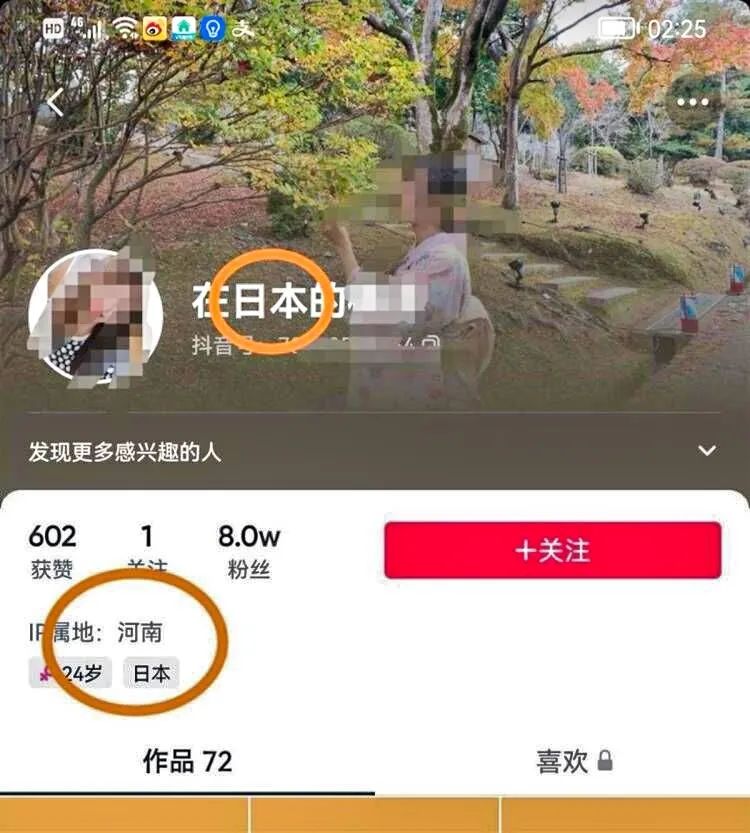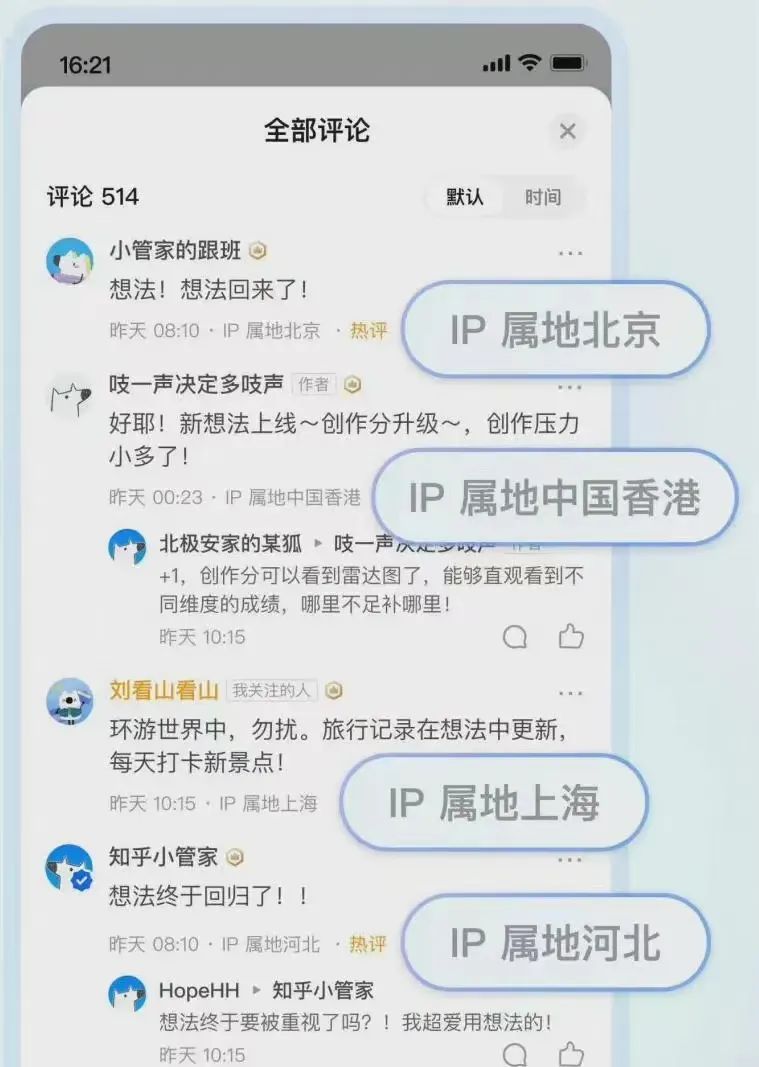You should have noticed that most self-media accounts have a "small tail" behind them, which shows a place name. Yes, this is the "IP Territorial" function that major platforms have launched in recent days, and users can’t turn off the display on their own.
The appearance of this function directly made some "keyboard men" shrink their hands, and also made some accounts claiming to be overseas show their "prototype". However, many people have doubts about this function, and others are worried that it will reveal privacy and leave security risks. Don’t worry, let’s discuss these problems below.

Tik Tok’s "XX in Japan" shows that the IP belongs to Henan (the picture comes from the network).
What is IP territory?
First of all, we should understand what IP is. IP is the abbreviation of Internet Protocol, which means Internet Protocol. And now we often say IP, which is actually the abbreviation of "IP address", and IP address is the Internet protocol address. Simply put, this is a concept on the network, which represents the network address of a device.
IP is also divided into public network and intranet. The so-called public network IP is the Internet, the largest network system in the world. Everyone can locate it directly according to this IP and has a unique identity. Intranet IP refers to the unique identity in a local area network (such as schools and companies).
Public IP is not available for every device, because public IP is a scarce resource. At present, IPV4 protocol is widely used, and IPV4 can provide about 4.29 billion IP addresses at most, which has become increasingly insufficient after so many years. IPV6 is still gaining popularity.
So how are these IP addresses allocated? The IP of public network is allocated by network operators, that is, telecommunications, mobile, China Unicom and so on. Intranet IP can be assigned by the administrator of the local area network (or set a dynamic allocation rule). When we are in school, we use our mobile phone to connect to the school’s WIFI, and at this time we will be assigned an intranet IP of a mobile phone. Computers on the Internet can be determined by public IP+ intranet IP.
Then, IP territory is not difficult to understand. Based on our use of the network, all internet devices will be assigned an IP address, no matter what kind of IP address has a home, that is, IP home.
Niu Kai, a professor at Beijing University of Posts and Telecommunications, told the media that IP territory is actually the geographical location information of the data packet generation place. If it is sent by desktop or laptop, it is the location of these devices. If it is sent by mobile phone, it is the location information of the mobile phone. In the equipment on the operator’s network side, this IP attribution information always exists and can be easily extracted. Now it is just displayed on the social network platform.
Can IP territory reflect the user’s location? Experts said that displaying IP attribution belongs to the communication core network technology, which is mainly based on DNS server (domain name system or domain name service) to extract IP address when domain name resolution is carried out. This technology is very mature. For a long time, display IP has not been widely used in social networks in China, but it has been widely used in many social networking platforms abroad.
At present, the ways of judging the IP territories of various platforms are basically the same. Sina Weibo judges the region by the IP territories of users who recently sent Weibo, comments and votes; Tik Tok and Today’s headlines are judged according to the IP address of the user’s last post or comment.
Does it reveal privacy and leave security risks?
Many users are worried that whether the platform displays the user’s "IP territory" will infringe on personal privacy? In fact, considering privacy protection, more specific geographical information will not be displayed when it is displayed in provinces (municipalities, autonomous regions and special administrative regions) and abroad to countries (regions).

IP territories will not display specific geographical location information (Source: Computer News)
Moreover, the concept and extension of user’s "IP territory" and "IP address" are different. Domestically, the former refers to the attribution of users’ IP, that is, the province to which IP operators belong, involving a huge number of users, ranging from millions to tens of millions, to nearly 100 million; The latter is the corresponding user equipment terminal, which is exclusively owned by individuals. If the complete IP address is displayed, the specific location of the user can be found through technical means, which will lead to invasion of privacy.
In an interview with the media, Wu Shen Kuo, assistant dean of the Internet Development Research Institute of Beijing Normal University and deputy director of the internet society of china Research Center, said that there are two points to consider: First, the granularity of IP territorial information is not enough to directly push individuals to specific identities through provinces, and the recognition rate is still relatively weak. Second, IP territorial information refers to the location of network access equipment rather than the non-human location.
Therefore, under normal circumstances, there is no need to worry that showing the user’s "IP territory" will reveal personal privacy.
Can IP territory be changed? Yes, there are risks.
In fact, the function of displaying IP territories is also easy to evade. Theoretically, IP can be displayed anywhere by using a proxy server. From this, the "black-gray" industry of paid IP proxy is derived, and information such as "the lowest 6 yuan can be changed" and "6-8 yuan has the desired IP address" appears in the network.
The criminals’ IP address change is based on dynamic IP proxy service, which is an internet access service that can change the login IP address in different regions of China. Experts explained that the so-called dynamic IP proxy service is actually to provide a temporary server and use the server’s IP instead of the real IP for data interaction.
In fact, the reason is very simple, that is, visitors do not take their original address to surf the Internet, but visit the proxy server to surf the Internet, so as to send back what they downloaded online. This is equivalent to using the server to build a bridge in the middle, which shows the address of the proxy server. "VPN (Virtual Private Network), which is commonly used by people, is the most common proxy method.
"In many cases, normal network communication also needs proxy servers, and the organizational structure of the Internet allows for proxy, so from a technical point of view, IP proxy cannot be completely banned." Niu Kai said that only technical monitoring and administrative supervision can be taken to strengthen the supervision of proxy service providers, monitor the data flow of network communication, and investigate and deal with illegal IP proxy behaviors.
Experts also reminded that it is necessary to be alert to the risks of IP agents. If some behaviors of proxy IP are recognized by the network platform, there is a risk of being blocked. In addition, if the IP proxy is unreliable, there may be problems such as fraudulent number theft, theft of financial accounts, and privacy disclosure.
Although it is easy to modify IP territorial information, it is of great significance for social platforms to display IP territorial information. Undoubtedly, it takes a certain cost to modify IP territorial information, and not everyone is willing to change it.
Why do you want to show IP territories?
As early as March this year, Weibo, a self-media platform, announced that in order to reduce bad behaviors such as pretending to be a party to a hot event, malicious rumors, and rubbing traffic, it would go online to publicly display the new function of users’ "IP dependency". Recently, Tik Tok, Today’s Headline, WeChat and other major platforms have given similar reasons in their announcements showing IP territories.
In the digital age, there are many network platforms and everyone has a microphone. Whenever there is a sudden hot news event at home and abroad, there is a lot of noise in the online public opinion field, and everyone is like a "news spokesperson." However, it goes without saying that there are many people who are afraid of public opinion. They either fish in troubled waters and rub the flow, or have ulterior motives, or make false rumors out of nothing, or engage in "regional blackness" with ulterior motives … All these have seriously disrupted the order of network information dissemination.
In order to purify cyberspace and maintain the order of online speech, relevant state departments have introduced a series of measures, including real-name registration system. On this basis, in 2021, the National Network Information Office issued the "Regulations on the Management of Internet User Account Name Information (Draft for Comment)". Article 12 clearly stated that the Internet user account service platform should display the account IP address territorial information on the Internet user account information page in a prominent way. The IP address territorial information of domestic Internet users’ accounts needs to be marked to provinces (autonomous regions and municipalities), and the IP address territorial information of overseas accounts needs to be marked to countries (regions).
It is obviously a response that the major platforms display the new functions of users’ "IP territories" online. Facts have proved that the function has achieved remarkable results after it went online. Objectively speaking, although they are all real names in the background, in the past, information was published anonymously, such as cyber violence, which was difficult for ordinary netizens to verify, and some unscrupulous keyboard men appeared. Displaying the IP address will have a deterrent effect on such users.
Compared with the previous Internet, the modern Internet has undergone a fundamental change. In the early days, the Internet belonged to the virtual world, and it was more of an entertainment attribute. Now, with the blessing of e-commerce platform, electronic payment, e-government and other applications, the Internet has developed into a part of social life and belongs to infrastructure. Just like the phrase we often hear, "The Internet is not a place of extra-legality", it is the general trend to maintain network order through various measures and means.
(The content of this article is integrated with Yangguang. com, Voice of China, Red Net, and a program, etc.)
Source: Beijing Science and Technology News Agency
关于作者